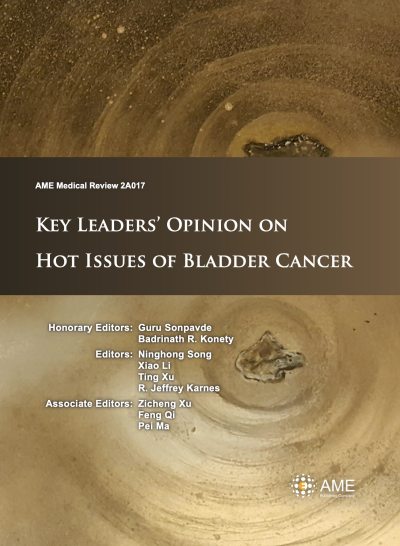
Key Leaders’ Opinion on Hot Issues of Bladder Cancer
| Editors: | Ninghong Song, Xiao Li, Ting Xu, R. Jeffrey Karnes |
Publisher: AME Publishing Company; 1st edition (2020)
ISBN: 978-988-74593-1-6
Hardcover: 236 pages
Language: English
Available at:

Over the past few decades, there has been a growing awareness of both the oncologic and quality of life consequences of bladder cancer diagnosis, treatment, and surveillance. Although many urinary markers for bladder cancer have now been approved by the FDA, there is not enough evidence to support replacing surveillance cystoscopy with any given marker. The treatment of bladder cancer mainly includes surgery (transurethral resection of bladder tumors [TURBt] and radical cystectomy), immunotherapy, chemotherapy (adjuvant chemotherapy and neoadjuvant chemotherapy), radiotherapy, targeted therapy, and other methods. In patients undergoing cystectomy, reports of approaches using more standardized measures of complications have demonstrated high rates of postoperative morbidity and mortality, particularly in elderly individuals. The robot-assisted technique is now being more widely studied as a potential approach to decrease operative blood loss and shorten recovery. Despite level I evidence supporting the use of neoadjuvant chemotherapy, there remains disagreement regarding its use over selective adjuvant therapy, given the modestbenefits seen with current regimens. Therefore, discussion to resolve the controversy regarding the diagnosis and treatment of BC is urgently needed.
This book covers a wide range of knowledge and includes many topics within urology. It has been informed by the collected opinions of urology experts from all over the world. It contains not only the consensus concerning the latest progress in the diagnosis and treatment of bladder cancer, but also other more controversial issues. We believe this publication provides a valuable summary ofthe important research in this field and can help promote clinical novelty by enlightening and provoking the thoughts of our readers.
HONORARY EDITORS
| Guru Sonpavde | Genitourinary Oncology Division, Dana-Farber Cancer Institute and Harvard Medical School, Boston, MA, USA |
| Badrinath R. Konety | Division of Urology, Rush University, Chicago, IL, USA |
EDITORS
| Ninghong Song | Department of Urology, The First Affiliated Hospital of Nanjing Medical University, Nanjing, China; The Affiliated Kezhou People’s Hospital of Nanjing Medical University, Kezhou, China |
| Xiao Li | Department of Urologic Surgery, Jiangsu Cancer Hospital & Jiangsu Institute of Cancer Research & Affiliated Cancer Hospital of Nanjing Medical University, Nanjing, China |
| Ting Xu | Department of Urologic Surgery, Jiangsu Cancer Hospital & Jiangsu Institute of Cancer Research & Affiliated Cancer Hospital of Nanjing Medical University, Nanjing, China |
| R. Jeffrey Karnes | Department of Urology, Mayo Clinic, Rochester, MN, USA |
ASSOCIATE EDITORS
| Zicheng Xu | Department of Urologic Surgery, Jiangsu Cancer Hospital & Jiangsu Institute of Cancer Research & Affiliated Cancer Hospital of Nanjing Medical University, Nanjing, China |
| Feng Qi | Department of Urologic Surgery, Jiangsu Cancer Hospital & Jiangsu Institute of Cancer Research & Affiliated CancerHospital of Nanjing Medical University, Nanjing, China |
| Pei Ma | Department of Oncology, The First Affiliated Hospital of Nanjing Medical University, Nanjing, China |








